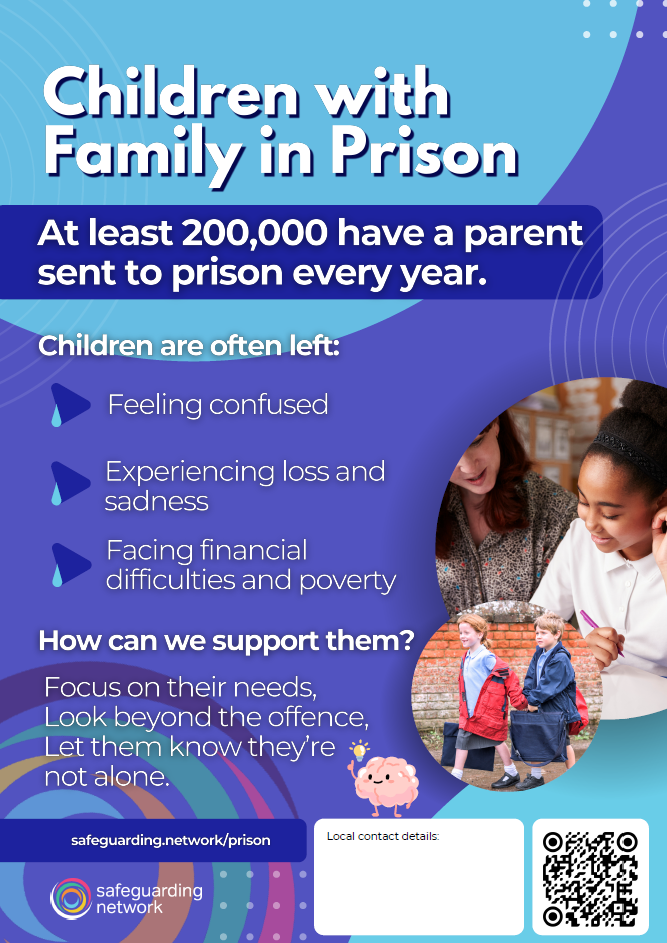Introduction
According to Keeping Children Safe in Education, 200,000 children have a parent sent to prison every year. Many more have a sibling or close family member in prison. The National Information Centre on Children of Offenders (NICCO) estimates the figure is closer to 310,000 and report that 10,000 children visit public prisons every week.
However, there is no formal record of who these children are and whether they are receiving support, often meaning that they are hidden and struggling alone.
Need more?
Thank you for visiting our resources pages. These are free to everyone as is our fortnightly safeguarding bulletin – general safeguarding information is too important to restrict. Become a member to access lots more, including training materials for you to deliver in-house on each topic in Keeping Children Safe in Education.
Sign up for FREE fortnightly bulletin.
What about training?
We can deliver training for your setting on this and other subjects via online platforms, or face-to-face in certain areas. Just get in touch to discuss your requirements.
There can be many barriers to children and young people telling us that they have a family member in prison, for example, stigma and embarrassment. You may find that children have not been told the true reason why a family member is not around, yet must deal with the loss.
They said he was just going away on a wee holiday for a couple of month, that was basically it… like I knew he was in jail and all that, but they tried to sugar it all up for me, cos I was just a kid basically….
Impact of having a family member in prison
When a parent or close family member has been sent to prison, it can impact children and young people in several ways.
- As mentioned above, to protect children, adults may choose to lie to them, saying that their family member is ‘working away’ or 'on holiday'.
- They may isolate themselves due to embarrassment or become isolated and judged by others for an offence they did not commit. Some children and young people feel so ashamed of their situation that they do not tell others about their family member’s imprisonment to avoid the risk of being bullied.
- They may lose regular contact or any contact with a person who held a significant role in their life.
- The family income may be affected when a parent or family member is sent to prison.
For children and young people this can lead to:
- poor physical and mental health;
- financial difficulties and poverty;
- anger and confusion about being lied to;
- fears for the family member in prison, especially if the prison is a long way from home;
- lack of support networks;
- significant trauma if they witnessed the arrest or the criminal activity that led to it;
- poor coping mechanisms, such as substance misuse;
- changes to behaviour;
- fear of being stigmatised by the ‘prisoner’ label;
- feelings of significant loss or rejection;
- absence from education due to ill-health, truancy, caring responsibilities, etc.
It’s important to ask - what else might they have experienced?
When a child or young person has a parent or other close family member in prison, they may have been witness to or involved in the act(s) that had led to the prison sentence. The police may have raided the home, there may be gang involvement, parental substance misuse, parental mental ill-health or domestic abuse.
We must remain open minded as to what issues may be affecting the child or young person in front of us.
What to do
Supporting children
Always consider – how could we support this young person?
Children with a family member in prison may be experiencing a range of feelings including loss, anger, sadness, confusion and guilt, particularly if the person in prison is their parent. They may also face conflicting emotions – for example, their parent is still their parent (and they still care about them), but they are in prison because they have done something illegal (so they may also feel guilty).
Children and young people with a family member in prison should be recognised as a group with unique needs. To support those affected, we must find out what they have been told and understand the issues they face.
Open conversations
- Discuss the child’s or young person’s needs with them and their carers. Find out how things have changed for them. Focus on their needs, not the offence.
- Maintain a non-judgmental attitude.
- Create a culture where children and young people feel confident to speak about their feelings and know where they can get support.
- Allow space and time for the child or young person to deal with their emotions.
- Let the child or young person know they are not alone and that it is not their fault.
- Consider involving children and young people in peer support groups.
- Check in regularly, as the child’s or young person’s needs may change.
Building partnerships with parents and carers
When working with parents and carers, practitioners should prioritise a child-centred approach, fostering partnerships to ensure understanding, support and safety.
Remember:
- Collaborative efforts are crucial, especially in cases of suspected harm.
- Practitioners must engage effectively with diverse families, demonstrating empathy, respect and cultural awareness.
- Communication should be clear, inclusive and accessible. Encouraging parental/carer involvement in decision-making and valuing their input is essential.
- Involving families and communities in designing processes fosters a holistic approach to safeguarding children.
- Continuous reflection and adaptation based on feedback from parents and carers enhance practice effectiveness.
- Have you considered if:
* parents or carers are embarrassed to disclose that a family member has been imprisoned?
* the child been told the truth about what has happened to their family member, and why they are no longer present in their lives?
* you can sign post families to organisations where they can access additional support?
* there is a role for Early Help?
FREE family member in prison poster
This free, downloadable resource raises the profile of safeguarding for your staff team. For use in staff rooms, on safeguarding boards or on the back of toilet doors, the poster includes tips, a space for local contact details, plus a link and QR codes to this resource page. Download the poster from the resources below.
DSL Training Materials
-

Family in prison - Presentation
-

Family in prison - Presenter notes
-

Family in prison - Handout for staff
-

Children with family members in prison – Quiz
-

Children with family members in prison – Quiz (Answer Sheet)
-

Children with family members in prison scenario (Early Years)
-

Children with family members in prison scenario (Early Years) – DSL information sheet
-

Children with family members in prison scenario (primary schools)
-

Children with family members in prison scenario (primary schools) – DSL information sheet
-

Children with family members in prison scenario (secondary schools)
-

Children with family members in prison scenario (secondary schools) – DSL Information Sheet
-

Children with family members in prison scenario (16+ settings)
-

Children with family members in prison scenario (16+) – DSL Information Sheet
-

Children with family members in prison scenario (SEND)
-

Children with family members in prison scenario (SEND) – DSL Information Sheet
-

Children with family members in prison scenario – (Care settings)
-

Children with family members in prison scenario (Care settings) – DSL Information Sheet
Resources
-

Family in prison poster
-

Digital Me: Children with a parent in prison
-

Are you a young person with a family member in prison?
-

Children Heard and Seen
-

Support for families and friends of prisoners
-

NICCO directory of resources
-

Creating safe spaces
Save time and improve your safeguarding approach…
Bite-size training materials to share with your staff every month.
Support to explore and develop your safeguarding culture.
A huge array of resources and professional experience at your fingertips.
Get in touch now for a personal tour of the site and details of membership benefits.
We look forward to working with you.


